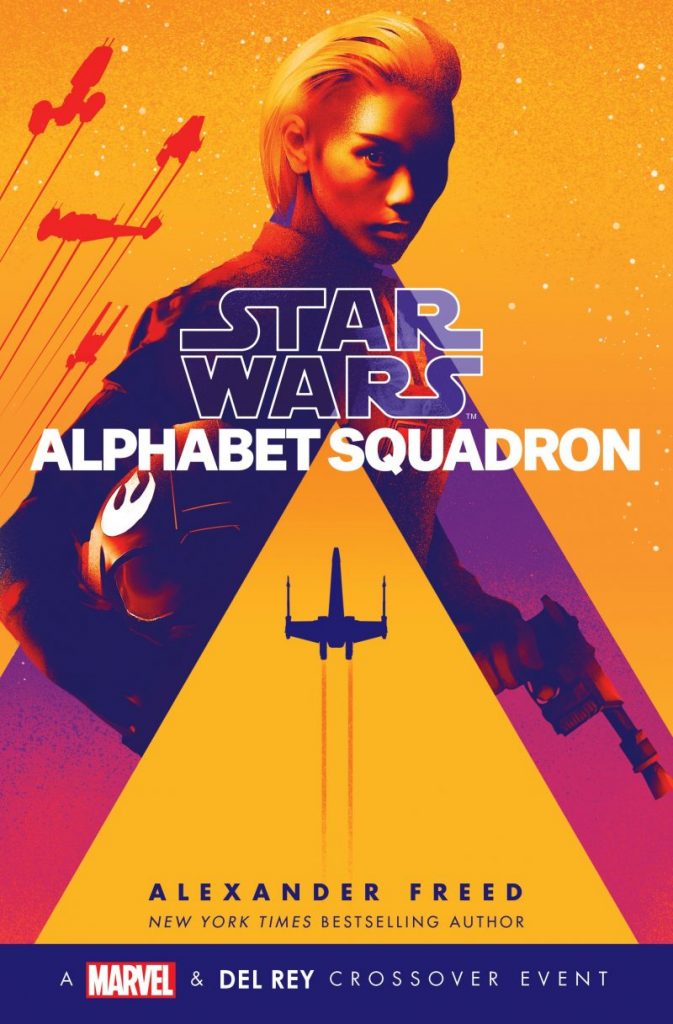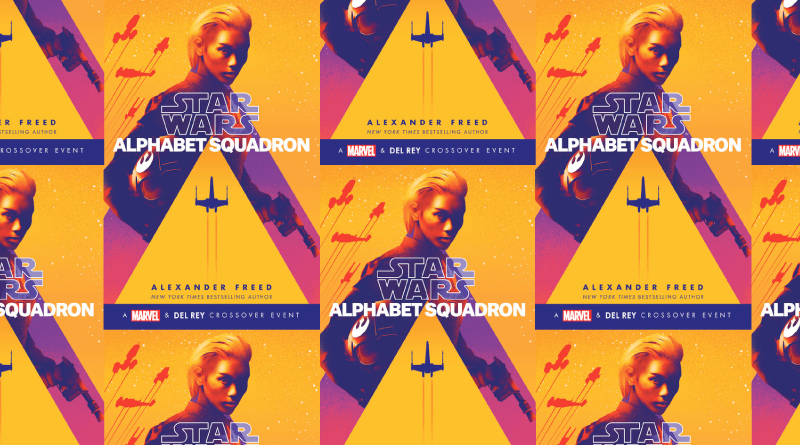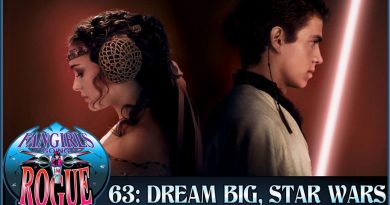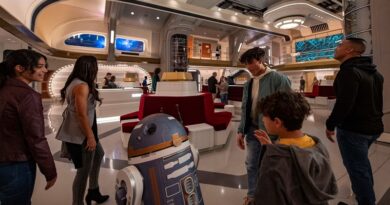Alexander Freed on Writing and Alphabet Squadron, an Interview
Alexander Freed moves fast. While at Star Wars Celebration Chicago, I was seated at breakfast, having coffee and a bagel, idly watching a group of Stormtroopers at the cafe while Luke Skywalker typed on a laptop a few tables away. Alex’s movement down the escalator in the distance caught my attention. Yet in the blink of my precaffeinated bleary eyes Freed had already disappeared before I could raise my hand to wave.
It’s not a surprise — Alex has a lot going on. He works on multiple active projects: he’s an author of the weekly webcomic Violet Dawn, he’s written the script for the Bioware video game Anthem’s comic and contributed to the game storyline – all while working as the Studio Writing Director at Fogbank Entertainment, where he not only has an editorial role but also writes the Eternal City storyline for their Storyscape platform. (Unfortunately it’s not yet available in the US.)
Alex was at Star Wars Celebration Chicago to promote his latest Del Rey Star Wars novel, Alphabet Squadron. Fortunately, I was able to catch up with him later. We chatted about Alphabet Squadron and in the interview, he shares how he gets it all done!

Q: Alphabet Squadron tells a story from the New Republic point of view, and Jody Houser’s Tie Fighter comics, tells the story from the Imperial point of view. You’ve worked across multiple platforms– video games, comic books, novels– was this collaboration similar or different?
A: There are definitely lessons I’ve learned from past projects that applied here. Mostly, though, it comes down to simple stuff, giving your creative partners as much room to work as possible. I wanted Jody Houser to tell her own story, just as she wanted me to tell mine–our job as collaborators was to find places where those stories could intertwine and enhance one another. (It reminded me a bit of working on the Star Wars: The Old Republic video game, where we had different writers working on different portions of a grand storyline and everyone did their best to complement one another, share the toys, and pick up on ideas and references created by one another.)
Q: Alphabet Squadron, like Battlefront: Twilight Company, is a very military novel. Did you do any particular research for it?
A: Research is an endless time sink and, in its way, a pleasurable one–part of why I became a writer was so I’d have an excuse to learn new things. Alphabet Squadron involved reading everything from studies on PTSD to military Reddit forums. On the technical side, I spent a while digging into books and articles about aviation and air warfare, with an eye to World War II-era material in particular (since Star Wars space battles tend to resemble battles from that era more than they do anything modern). This was helpful to me in many ways, though I certainly could’ve done ten times as much research and still not come close to capturing a real pilot’s experience.
Fortunately, Star Wars isn’t real and there’s a lot of room for invention. Trying to be totally true to life is a mistake, as I see it–a fighter jet is not an X-wing and the modern American military is not the New Republic–but the more I know the better chance I have at capturing a faint echo of real emotion.
Q: I really enjoyed Yrica Quell as a character– she’s tough, smart and resilient and we are introduced to her at a really vulnerable moment in her life. Who or what inspired you while developing her character?
A: Quell exists to explore some very dark ideas about what it means to serve in the Empire. To that end, I knew that she had to be sympathetic and even admirable in a lot of ways or else readers would instantly write her off. Much of who she is developed out of those goals, and of course was blended with traits I’ve seen and traits I’ve experienced. There’s a very distant echo of a friend or two in there, between her intelligence and blunt social awkwardness, but she’s not drawn cleanly from any one model.
Q: You’ve written stories in various Star Wars time periods; do you have a favorite one? Are some periods more challenging than others?
A: I’m very much enjoying working in the post-Return of the Jedi world–I find the question of “The galaxy is emerging from a terrible place; what do we do now?” to be a compelling one, and one that inspires a lot of story ideas.
That said, the sheer openness of the Old Republic era(s) will always have its appeal, and of course it’s where I got my start as a Star Wars writer. I wouldn’t mind visiting Jedi and Sith armies once more!
Q: You have a lot of projects coming to fruition this year and across multiple storylines! How do you keep all that creativity organized? What advice to have for other writers in maintaining a balance?
A: While I’m sure some writers are energized by it, I really don’t recommend juggling multiple stories at the same time–I do it because the opportunities arose, not out any intrinsic desire to spread myself thin! Faced with the situation, though, I find a few things help:
First, I keep a pretty strict schedule for anything with a deadline. I track my progress, I make sure I’m going to hit certain milestones on certain dates, and if something starts slipping I do my best to adjust.
Second, I do a lot of detailed outlining in advance. For me, that means the imaginative, creative part is already done by the time I start writing, and the outline gives me a roadmap even when I’m tired and don’t much feel like grinding out a thousand words. I don’t have to figure out what happens on the next page–I just need to type it up. (I also try to avoid outlining multiple projects at the same time–that’s a lot of creative energy to spread around.)
Third, it helps me when my different projects are VERY different–different genres and different media, say. I can handle a fantasy comic book and a Star Wars novel at the same time, but probably would struggle switching between two different fantasy novels. The separation helps keep me excited about each one and helps prevent accidental “seepage” between them!
Thanks to Alexander Freed for participating in this interview.
Looking for more on Alphabet Squadron? Check out Kay’s review.
- The (Re)Ascendancy of Thrawn - February 19, 2022
- Get your Chiss On: A Review of Thrawn Ascendancy Chaos Rising - September 17, 2020
- Review: Shadow Fall (a Star Wars Alphabet Squadron Book) - June 26, 2020










